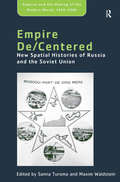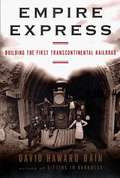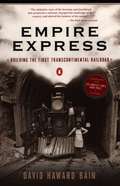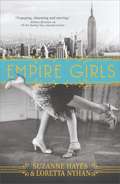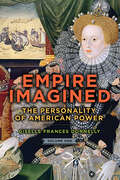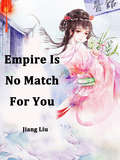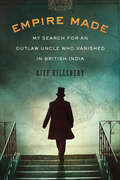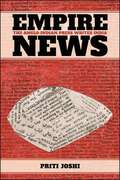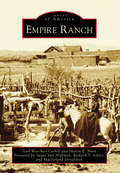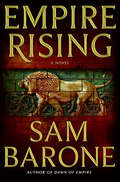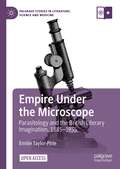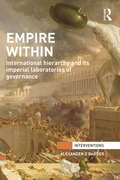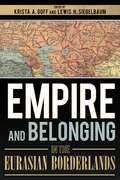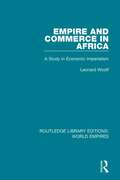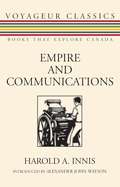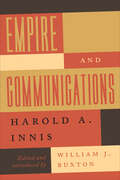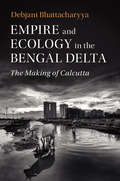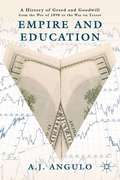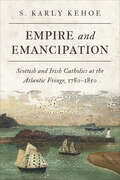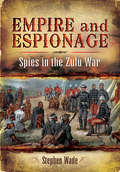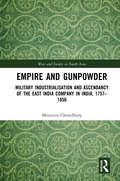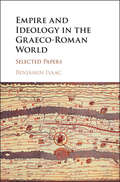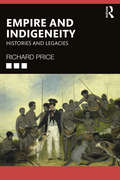- Table View
- List View
Empire De/Centered: New Spatial Histories of Russia and the Soviet Union (Empire and the Making of the Modern World, 1650-2000)
by Sanna Turoma Maxim WaldsteinIn 1991 the Soviet empire collapsed, at a stroke throwing the certainties of the Cold War world into flux. Yet despite the dramatic end of this 'last empire', the idea of empire is still alive and well, its language and concepts feeding into public debate and academic research. Bringing together a multidisciplinary and international group of authors to study Soviet society and culture through the categories empire and space, this collection demonstrates the enduring legacy of empire with regard to Russia, whose history has been marked by a particularly close and ambiguous relationship between nation and empire building, and between national and imperial identities. Parallel with this discussion of empire, the volume also highlights the centrality of geographical space and spatial imaginings in Russian and Soviet intellectual traditions and social practices; underlining how Russia's vast geographical dimensions have profoundly informed Russia's state and nation building, both in practice and concept. Combining concepts of space and empire, the collection offers a reconsideration of Soviet imperial legacy by studying its cultural and societal underpinnings from previously unexplored perspectives. In so doing it provides a reconceptualization of the theoretical and methodological foundations of contemporary imperial and spatial studies, through the example of the experience provided by Soviet society and culture.
Empire Express
by David Haward BainThis is a thoroughly researched and documented history of the perils and progress surrounding the transcontinental railroad. The politics of the time are enlightening too.
Empire Express: Building the First Transcontinental Railroad
by David Haward BainBeginning in 1842, Bain captures three dramatic decades in which the U. S. effectively doubled in size, fought three wars, and began to discover a new national identity. The narrative ends in 1873 in Washington, DC, with the crushing fall of a popular politician and the exposure of a powerful, hidden railroad lobby -- a scandal which dominated the press and the country's imagination for six months. The book draws on original sources and provides a new dimension not only to the epic endeavor of the transcontinental railroad but also to the culture, political struggles and social conflicts of an unforgettable period in American history. "A drama of conflict, adventure, excitement, and suspense. " Archival photos.
Empire Films and the Crisis of Colonialism, 1946–1959
by Jon CowansThe first transnational history of cinema’s role in decolonization.Using popular cinema from the United States, Britain, and France, Empire Films and the Crisis of Colonialism, 1946–1959, examines postwar Western attitudes toward colonialism and race relations. Historians have written much about the high politics of decolonization but little about what ordinary citizens thought about losing their empires. Popular cinema provided the main source of images of the colonies, and, according to Jon Cowans in this far-reaching book, films depicting the excesses of empire helped Westerners come to terms with decolonization and even promoted the dismantling of colonialism around the globe.Examining more than one hundred British, French, and American films from the post–World War II era, Cowans concentrates on movies that depict interactions between white colonizers and nonwhite colonial subjects, including sexual and romantic relations. Although certain conservative films eagerly supported colonialism, Cowans argues that the more numerous "liberal colonialist" productions undermined support for key aspects of colonial rule, while a few more provocative films openly favored anticolonial movements and urged "internal decolonization" for people of color in Britain, France, and the United States.Combining new archival research on the films’ production with sharp analysis of their imagery and political messages, the book also assesses their reception through box-office figures and newspaper reviews. It examines both high-profile and lesser-known films on overseas colonialism, including The King and I, Bhowani Junction, and Island in the Sun, and tackles treatments of miscegenation and "internal colonialism" that appeared in Westerns and American films like Pinky and Giant. The first truly transnational history of cinema’s role in decolonization, this powerful book weaves a unified historical narrative out of the experiences of three colonial powers in diverse geographic settings.
Empire Girls
by Loretta Nyhan Suzanne HayesThe critically acclaimed authors of I'll Be Seeing You return with a riveting tale of two sisters, set in the intoxicating world of New York City during the Roaring Twenties. Ivy and Rose Adams may be sisters, but they're nothing alike. Rose, the eldest, is the responsible one, while Ivy is spirited and brazen. After the unexpected death of their father, the women are left to reconcile the estate, when they make a shocking discovery: not only has their father left them in financial ruin, but he has also bequeathed their beloved family house to a brother they never knew existed. With only a photograph to guide the way, Ivy and Rose embark to New York City, determined to find this mysterious man and reclaim what is rightfully theirs. Once in New York, temptations abound at every turn, and soon the sisters are drawn into the glitzy underbelly of Manhattan, where they must overcome their differences and learn to trust each other if they're going to survive in the big city and find their brother. Filled with unforgettable characters and charm, Empire Girls is a love letter to 1920s New York, and a captivating story of the unspoken bond between sisters.
Empire Imagined: The Personality of American Power, Volume One
by Giselle Frances DonnellyThe origins of the United States' distinct approach to war and military power are found in the colonial experience. Long before 1776 or 1619, Englishmen understood themselves to be a part of a larger, lost "British" empire that might disappear forever in the globe-girdling shadow of the Spanish Hapsburgs and their drive to extirpate Protestantism. A combination of geopolitical ambition and fear of Philip II propelled Elizabethan expansion into North America. During the queen's five decades on the throne, the British imperial impulse jelled into a distinct and widely shared strategic culture, anchored in a deeply held faith and political ideology that legitimized Tudor rule; increasingly centralized Tudor power across England, Scotland, and Ireland; forced attention to the continental European balance of power; and drew adventurers to explore the world and claim a toehold in North America. In Empire Imagined, Giselle Frances Donnelly traces the development of these enduring habits through a series of vignettes that reveal the interaction of a maturing strategic consensus and the contingencies inevitable in international politics and offers a unique perspective for understanding the current debate about America's role in the world.
Empire Is No Match For You: Volume 1 (Volume 1 #1)
by Jiang LiuThat spring was bright and beautiful. She was diagnosed pregnant by the Imperial Physician, but he had someone send her a bowl of soup. She was heartbroken and her tears dried up.
Empire Made: My Search for an Outlaw Uncle Who Vanished in British India
by Kief HillsberyLost in time for generations, the story of a 19th-century English gentleman in British India—a family mystery of love found and loyalties abandoned, finally brought to light In 1841, twenty-year-old Nigel Halleck set out for Calcutta as a clerk in the East India Company. He went on to serve in the colonial administration for eight years before abruptly leaving the company under a cloud and disappearing in the mountain kingdom of Nepal, never to be heard from again. While most traces of his life were destroyed in the bombing of his hometown during World War II, Nigel was never quite forgotten—the myth of the man who headed East would reverberate through generations of his family. Kief Hillsbery, Nigel&’s nephew many times removed, embarked on his own expedition, spending decades researching and traveling through India, Pakistan, Afghanistan, and Nepal in the footsteps of his long-lost relation. In uncovering the remarkable story of Nigel&’s life, Hillsbery beautifully renders a moment in time when the arms of the British Empire extended around the world. Both a powerful history and a personal journey, Empire Made weaves together a clash of civilizations, the quest to discover one&’s own identity, and the moving tale of one man against an empire.
Empire News: The Anglo-Indian Press Writes India (SUNY series in the History of Books, Publishing, and the Book Trades)
by Priti JoshiShortlisted for the 2022 George A. and Jeanne S. DeLong Book History Book Prize presented by the Society for the History of Authorship, Reading and PublishingWinner of the 2021 Robert and Vineta Colby Scholarly Book Prize presented by the Research Society for Victorian PeriodicalsIn Empire News, Priti Joshi examines the neglected archive of English-language newspapers from India to unpack the maintenance and tensions of empire. Focusing on the period between 1845 and 1860, she analyzes circulation—of newspapers and news, of peoples and ideas—and newspapers' coverage and management of crises. The book explores three moments of colonial crisis. The sensational trial of East India Company vs. Jyoti Prasad in Agra in 1851 as the Kohinoor diamond is exhibited in London's Hyde Park is a case lost but for colonial newspapers. In these accounts, the trial raises the specter of Warren Hastings and the costs of empire. The Uprising of 1857 was a geopolitical crisis, but for the Indian news media it was a story simultaneously of circulation and blockage, of contraction and expansion, of colonial media confronting its limits and innovating. Finally, Joshi traces circuits of exchange between Britain and India and across media platforms, including Dickens's Household Words, where the empire's mofussil (margin) appears in an unrecognized guise during and after the Uprising. By attending to these fascinating accounts in the Anglo-Indian press, Joshi illuminates the circulation and reproduction of colonial narratives and informs our understanding of the functioning of empire.
Empire Ranch
by Gail Waechter Corkill Sharon E. HuntThe Empire Ranch sits in the heart of the rolling grasslands and oak-studded foothills of Las Cienegas National Conservation Area in southeastern Arizona. Its remarkable history and the ranching way of life are told through the stories of the men, women, and children of the Empire, most notably the Vail, Boice, and Donaldson families. Walter L. Vail and Herbert R. Hislop purchased the Empire Ranch homestead for $2,000 in 1876. The Vail family operated the ranch until 1928, turning it into a cattle ranching empire. From 1928 to 1975, the well-respected Boice family ran a vibrant Hereford operation on the Empire. The Donaldson family used innovative range management methods to continue the ranching legacy from 1975 to 2009. Today, the ranch, under the management of the Bureau of Land Management, remains one of the oldest continuously working cattle ranches in the region.
Empire Rising
by Thomas KellyA novel about the construction of the Empre State Building and the rampant corruption from Tammany Hall to the mean streets of the Bronx.
Empire Rising: A Novel (Eskkar Saga #3)
by Sam BaroneInto this violent, unsettled land come the outcast Korthac and the remnants of his mighty desert fighters. Joining forces with Ariamus and his brutal band of thieves, the invaders set their sights on the biggest prize of all: the burgeoning city of Akkad—already renowned for its riches . . . and for the courage and wisdom of its two leaders.The former barbarian, Eskkar, and his beloved wife, Trella, face a challenge far more daunting than the savage horde that previously threatened the young city they built together and have sworn to protect. For, while Eskkar roams the land, hoping to bring other towns into his growing empire, an insidious menace is slipping unnoticed into Akkad, intending to wreak havoc from within—to loot and enslave . . . and bring death.
Empire Under the Microscope: Parasitology and the British Literary Imagination, 1885–1935 (Palgrave Studies in Literature, Science and Medicine)
by Emilie Taylor-PirieThis open access book considers science and empire, and the stories we tell ourselves about them. Using British Nobel laureate Ronald Ross (1857-1932) and his colleagues as access points to a wider professional culture, Empire Under the Microscope explores the cultural history of parasitology and its relationships with the literary and historical imagination between 1885 and 1935. Emilie Taylor-Pirie examines a wealth of archival material including medical lectures, scientific publications, popular biography, and personal and professional correspondence, alongside novels, poems, newspaper articles, and political speeches, to excavate the shared vocabularies of literature and medicine. She demonstrates how forms such as poetry and biography; genres such as imperial romance and detective fiction; and modes such as adventure and the Gothic, together informed how tropical diseases, their parasites, and their vectors, were understood in relation to race, gender, and nation. From Ancient Greece, to King Arthur’s Knights, to the detective work of Sherlock Holmes, parasitologists manipulated literary and historical forms of knowledge in their professional self-fashioning to create a modern mythology that has a visible legacy in relationships between science and society today.
Empire Within: International Hierarchy and its Imperial Laboratories of Governance (Interventions)
by Alexander D BarderThis book explores the reverberating impacts between historical and contemporary imperial laboratories and their metropoles through three case studies concerning violence, surveillance and political economy. The invasions of Afghanistan in 2001 and Iraq in 2003 forced the United States to experiment and innovate in considerable ways. Faced with growing insurgencies that called into question its entire mission, the occupation authorities engaged in a series of tactical and technological innovations that changed the way it combated insurgents and managed local populations. The book presents new material to develop the argument that imperial and colonial contexts function as a laboratory in which techniques of violence, population control and economic principles are developed which are subsequently introduced into the domestic society of the imperial state. The text challenges the widely taken for granted notion that the diffusion of norms and techniques is a one-way street from the imperial metropole to the dependent or weak periphery. This work will be of great interest to scholars of international relations, critical security studies and international relations theory.
Empire and Belonging in the Eurasian Borderlands
by Lewis H. Siegelbaum Krista A. GoffEmpire and Belonging in the Eurasian Borderlands engages with the evolving historiography around the concept of belonging in the Russian and Ottoman empires. The contributors to this book argue that the popular notion that empires do not care about belonging is simplistic and wrong.Chapters address numerous and varied dimensions of belonging in multiethnic territories of the Ottoman Empire, Imperial Russia, and the Soviet Union, from the mid-nineteenth to the late twentieth centuries. They illustrate both the mutability and the durability of imperial belonging in Eurasian borderlands.Contributors to this volume pay attention to state authorities but also to the voices and experiences of teachers, linguists, humanitarian officials, refugees, deportees, soldiers, nomads, and those left behind. Through those voices the authors interrogate the mutual shaping of empire and nation, noting the persistence and frequency of coercive measures that imposed belonging or denied it to specific populations deemed inconvenient or incapable of fitting in. The collective conclusion that editors Krista A. Goff and Lewis H. Siegelbaum provide is that nations must take ownership of their behaviors, irrespective of whether they emerged from disintegrating empires or enjoyed autonomy and power within them.
Empire and Commerce in Africa: A Study in Economic Imperialism (Routledge Library Editions: World Empires #16)
by Leonard WoolfIn this title, originally published in 1920, Leonard Woolf traces the history of economic imperialism and explores the relations of Europe and Africa since 1876. This analysis of economic imperialism helped to shape attitudes to colonialism for more than one generation of radicals and socialists, and still has the power to influence and inform today.
Empire and Communications
by Alexander John Watson Harold A. InnisIt’s been said that without Harold A. Innis there could have been no Marshall McLuhan. Empire and Communications is one of Innis’s most important contributions to the debate about how media influence the development of consciousness and societies. In this seminal text, he traces humanity’s movement from the oral tradition of preliterate cultures to the electronic media of recent times. Along the way, he presents his own influential concepts of oral communication, time and space bias, and monopolies of knowledge.
Empire and Communications
by Harold A. InnisOriginally published in 1950, Harold A. Innis’s Empire and Communications is considered to be one of the classic works in media studies, yet its origins have received little attention. Ambitious in its scope, the book spans five millennia, tracing a path of development around the globe from 2900 BCE to the twentieth century and revealing the cyclical interplay between communications and power structures across space and time. In this new edition, William J. Buxton pays close attention to handwritten glosses that Innis added to a copy of the original edition and the revisions undertaken by his widow, Mary Q. Innis. A new introduction provides a detailed account of how the book emerged from lectures that Innis delivered at Oxford University in 1948, as well as how it related to other presentations Innis made in Britain during the same period. It explores how Innis sought to enrich his analysis by incorporating material related to phenomena such as war, education, religion, culture, geography, and finance. An insightful foreword by Marshall McLuhan is included, as well as bibliographical references and a revised index. By providing a narrative based on extensive notes from Innis, this edition makes Empire and Communications more accessible and contributes to the broad efforts to shape Innis’s legacy.
Empire and Ecology in the Bengal Delta: The Making Of Calcutta (Studies In Environment And History )
by Debjani BhattacharyyaWhat happens when a distant colonial power tries to tame an unfamiliar terrain in the world's largest tidal delta? <P><P>This history of dramatic ecological changes in the Bengal Delta from 1760 to 1920 involves land, water and humans, tracing the stories and struggles that link them together. Pushing beyond narratives of environmental decline, Bhattacharyya argues that 'property-thinking', a governing tool critical in making land and water discrete categories of bureaucratic and legal management, was at the heart of colonial urbanization and the technologies behind the draining of Calcutta. The story of ecological change is narrated alongside emergent practices of land speculation and transformation in colonial law. Bhattacharyya demonstrates how this history continues to shape our built environments with devastating consequences, as shown in the Bay of Bengal's receding coastline.<P> The first environmental history of land markets in South Asia.<P> Explores how the law responded to the ecological changes of the Bengal delta and how those laws continue to shape our contemporary relationship to the land and the water.<p> Shows landscapes as essentially fluid and changeable, destabilizing the fixities of cartography.
Empire and Education
by A. J. AnguloThis book is about education and American imperialism from the War of 1898 to the War on Terror. Very little coordinated or sustained research has been devoted to the broader contours of America, education, and empire. And third, this volume seeks to inspire new directions in the study of American educational history.
Empire and Emancipation: Scottish and Irish Catholics at the Atlantic Fringe, 1780–1850 (Studies in Atlantic Canada History)
by S. Karly KehoeEmpire and Emancipation explores how the agency of Scottish and Irish Catholics redefined understandings of Britishness and British imperial identity in colonial landscapes. In highlighting the relationship of Scottish and Irish Catholics with the British Empire, S. Karly Kehoe starts an important and timely debate about Britain’s colonizer constituencies. The colonies of Nova Scotia, Cape Breton Island, Newfoundland, and Trinidad had some of the British Empire’s earliest, largest, and most diverse Catholic populations. These were also colonial spaces where Catholics exerted significant influence. Given the extent to which Scottish and Irish Catholics were constrained at home by crippling legislation, long-established patterns of socio-economic exclusion, and increasing discrimination, the British Empire functioned as the main outlet for their ambition. Kehoe shows how they engaged with and benefitted from the security needs of an expanding empire, the aspirations of an emerging middle class, and Rome’s desire to expand its influence in British territories. Examining the experience of Scottish and Irish Catholics in these colonies exposes how the empire levelled the playing field for Britain’s national groups and brokered a stronger and more coherent British identity. In highlighting specific aspects of the complex and multifaceted relationship between Catholicism and the British imperial state, Kehoe presents Britishness as an identity defined much more by civil engagement and loyalism than by religion. In this way, Empire and Emancipation furthers our understanding of Britain and Britishness in the Atlantic world.
Empire and Espionage: Spies in the Zulu War
by Stephen WadeThe Anglo-Zulu War may be best remembered for the military blundering that led to the astonishing British defeat at Isandlwana, but as Stephen Wade shows in this book, military action throughout the war was supplemented by the actions of spies and explorers in the field, and was often heavily influenced by the decisions made by diplomats.Examining the roles of both spies and diplomats, the author looks at numerous influential figures in the conflict, including John Dunn, who fought with the British during the campaign, becoming ruler of part of Zululand after its conquest and even being presented to Queen Victoria. Diplomats include Sir Theophilus Shepstone, who was responsible for directing native affairs in Natal, and was so respected by the Zulus they called him Father.This unique and fascinating account of espionage and diplomacy in the nineteenth century demonstrates not only a side of warfare rarely considered in traditional histories of the period, but also gives examples of individuals who were able to earn the respect and trust of the native peoples, another rarely seen facet of the colonial period.
Empire and Gunpowder: Military Industrialisation and Ascendancy of the East India Company in India, 1757–1856 (War and Society in South Asia)
by Moumita ChowdhuryThis book focuses on the relation between technology, warfare and state in South Asia in the eighteenth and the nineteenth centuries. It explores how gunpowder and artillery played a pivotal role in the military ascendancy of the East India Company in India. The monograph argues that the contemporary Indian military landscape was extremely dynamic, with contemporary indigenous polities (Mysore, the Maratha Confederacy and the Khalsa Kingdom) attempting to transform their military systems by modelling their armies on European lines. It shows how the Company established an edge through an efficient bureaucracy and a standardised manufacturing system, while the Indian powers primarily focused on continuous innovation and failed to introduce standardisation of production. Drawing on archival records from India and the UK, this volume makes a significant intervention in our understanding of the rise of the British Empire in South Asia. It will be of great interest to scholars and researchers of history, especially military history, military and strategic studies and South Asian studies.
Empire and Ideology in the Graeco-Roman World: Selected Papers
by Benjamin IsaacBenjamin Isaac is one of the most distinguished historians of the ancient world, with a number of landmark monographs to his name. This volume collects most of his published articles and book chapters of the last two decades, many of which are not easy to access, and republishes them for the first time along with some brand new chapters. The focus is on Roman concepts of state and empire and mechanisms of control and integration. Isaac also discusses ethnic and cultural relationships in the Roman Empire and the limits of tolerance and integration, as well as attitudes to foreigners and minorities, including Jews. The book will appeal to scholars and students of ancient, imperial, and military history, as well as to those interested in the ancient history of problems which still resonate in today's societies.
Empire and Indigeneity: Histories and Legacies
by Richard PriceIndigeneity is inseparable from empire, and the way empire responds to the Indigenous presence is a key historical factor in shaping the flow of imperial history. This book is about the consequences of the encounter in the early nineteenth century between the British imperial presence and the First Peoples of what were to become Australia and New Zealand. However, the shape of social relations between Indigenous peoples and the forces of empire does not remain constant over time. The book tracks how the creation of empire in this part of the world possessed long-lasting legacies both for the settler colonies that emerged and for the wider history of British imperial culture.
